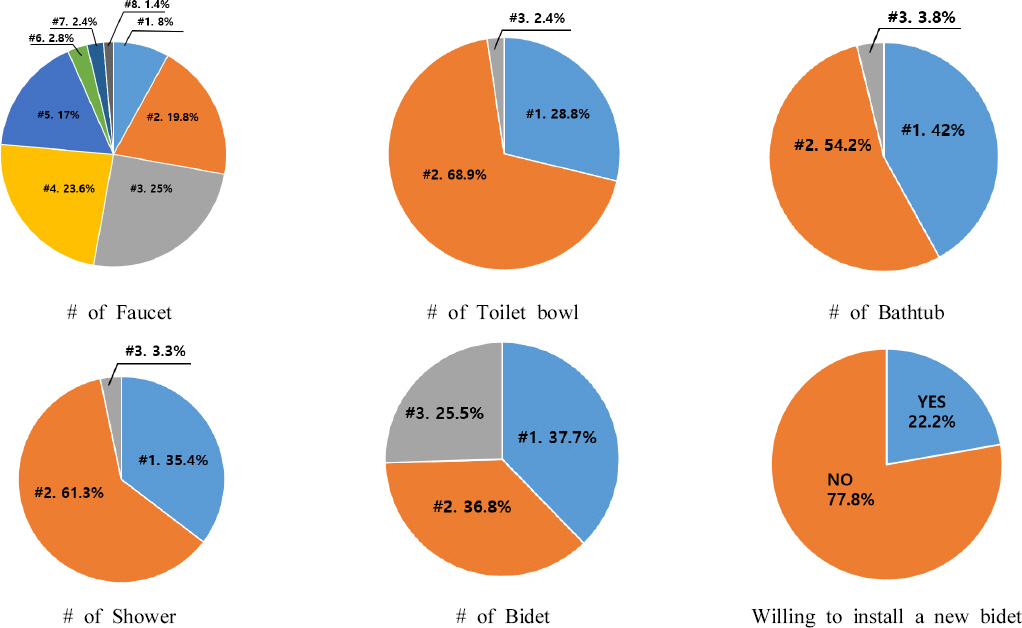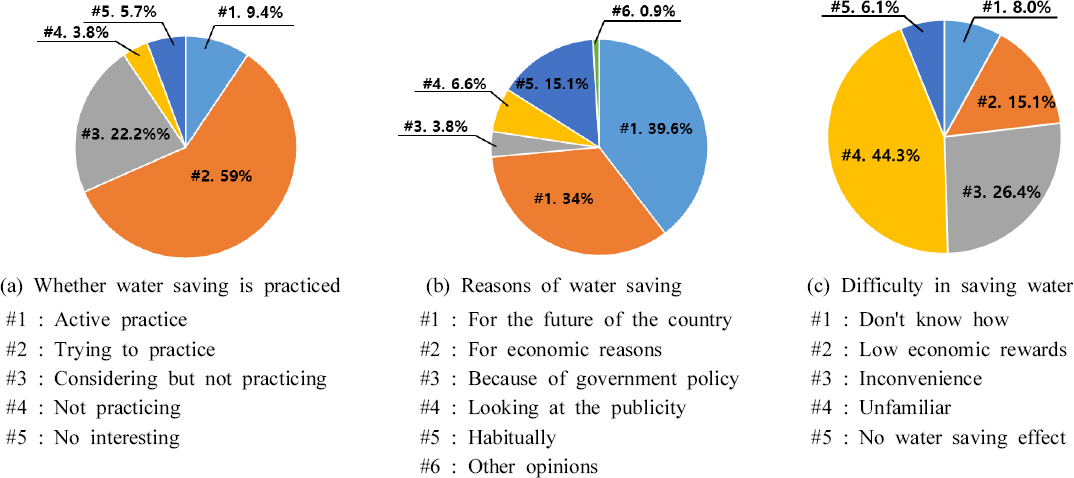1. ņä£ ļĪĀ
ņÜ░ļ”¼ļéśļØ╝ņØś ņŚ░ĒÅēĻĘĀ Ļ░Ģņłśļ¤ēņØĆ ņĢĮ 1,300 mmļĪ£ ļåÆņØĆ ņłśņżĆņØ┤ļéś, ņØĖĻĄ¼ļ░ĆļÅäĻ░Ć 509.2ņØĖ/km
2ļĪ£ ļ¦żņÜ░ ļåÆņØĆ ĒÄĖņØ┤ļŗż. ņØ┤ņŚÉ ļö░ļØ╝ 1ņØĖļŗ╣ Ļ░Ģņłśļ¤ēņØ┤ 2,591 m
3/yearļĪ£ ņäĖĻ│äĒÅēĻĘĀņØś ņĢĮ 13% ņłśņżĆņØ┤ļ®░, 1ņØĖļŗ╣ Ļ░ĆņÜ®ņłśņ×ÉņøÉņØś ņ¢æļÅä 1,511 m
3/yearļĪ£ ņäĖĻ│äĒÅēĻĘĀņØś 17%ņŚÉ ļČłĻ│╝ĒĢ£ ņłśņżĆņØ┤ļŗż(
Kim and Yun, 2010). ļśÉĒĢ£ ņŚ¼ļ”äņ▓ĀņŚÉ Ļ░ĢņÜ░Ļ░Ć ņ¦æņżæļÉśņ¢┤ ļ¼╝ ņé¼ņÜ® ņŚ¼Ļ▒┤ņØ┤ ļČłļ”¼ĒĢśļ®░, ĒĢśņ▓£ņ£╝ļĪ£ļČĆĒä░ņØś ņĘ©ņłśņ£©ļÅä 36%ļĪ£ ļé«ņĢä ļ¼╝ņŖżĒŖĖļĀłņŖż ļåÆņØī ĻĄŁĻ░ĆļĪ£ ļČäļźśļÉśĻ│Ā ņ׳ļŗż.
Ministry of Land, Infrastructure and Transport (2016)ņØĆ Ļ░ĆļŁäņāüĒÖ® ļ░Å ņłśņÜöņŚÉ ļö░ļØ╝ 2020ļģäņŚÉ 4.0ņ¢Ą m
3ņØś ļ¼╝ņØ┤ ļČĆņĪ▒ĒĢĀ Ļ▓āņØ┤ļ®░, ĒŖ╣Ē׳ ņ¦ĆņŚŁļ│ä ļ¼╝ ļČĆņĪ▒ņØ┤ ņŗ¼ĒÖöĒĢĀ Ļ▓āņ£╝ļĪ£ ņśłņĖĪĒĢ£ ļ░ö ņ׳ļŗż. ņØ┤ņŚÉ Ļ│ĄĻĖēĻ░ĆļŖźĒĢ£ ņłśņ×ÉņøÉņØś ņ┤Øļ¤ēņØ┤ ņĀ£ĒĢ£ļÉ£ ņāüĒÖ®ņŚÉņä£ ņłśņÜö ņĀłĻ░ÉņØä ĒåĄĒĢśņŚ¼, ļ¼╝ ļČĆņĪ▒ņØä ĒĢ┤Ļ▓░ĒĢĀ ĒĢäņÜöĻ░Ć ļīĆļæÉļÉśĻ│Ā ņ׳ļŗż.
ņØ┤ņŚÉ ņĄ£ĻĘ╝ ņÜ░ļ”¼ļéśļØ╝ņØś ņłśņ×ÉņøÉ ņĀĢņ▒ģņØĆ Ļ░£ļ░£ņØä ĒåĄĒĢ£ ņłśņ×ÉņøÉ Ļ│ĄĻĖēļ¤ē ĒÖĢļīĆņŚÉ ĻĖ░ļ░śĒĢ£ Ļ│ĄĻĖēĻ┤Ćļ”¼ ņĀĢņ▒ģņØä ĒāłĒö╝ĒĢśĻ│Ā, ņłśņÜöĻ┤Ćļ”¼ ļō▒ņØä ĒåĄĒĢśņŚ¼ ņĀ£ĒĢ£ļÉ£ ņłśņ×ÉņøÉņØä ĒÜ©Ļ│╝ņĀüŌŗģĒÜ©ņ£©ņĀüņ£╝ļĪ£ ĒÖ£ņÜ®ĒĢśĻĖ░ ņ£äĒĢ£ ņĀĢņ▒ģņØ┤ ņÜ░ņäĀņŗ£ ļÉśĻ│Ā ņ׳ļŗż(
Seo et al., 2011).
Ministry of Environment (2007a)ļŖö ŌĆśļ¼╝ ņĀłņĢĮ ņóģĒĢ®ļīĆņ▒ģŌĆÖņŚÉ ļö░ļźĖ ļģĖĒøäņłśļÅäĻ┤Ć ĻĄÉņ▓┤, ņĀłņłśĒśĢ ņłśļÅäņÜöĻĖłņ▓┤Ļ│ä ļÅäņ×ģ, ņĀłņłśĻĖ░ĻĖ░ ļ░Å ņżæņłśļÅä ņäżņ╣ś ĒÖĢļīĆ ļō▒ņØś ņČöņ¦äņØä ĒåĄĒĢ┤ 2009ļģäĻ╣īņ¦Ć ļ¬©ļæÉ 8ņ¢Ą 6ņ▓£ 8ļ░▒ļ¦ī ĒåżņØś ņłśļÅŚļ¼╝ņØä ņĀłņĢĮĒĢśļŖö ņä▒Ļ│╝ļź╝ Ļ▒░ļæÉņŚłļŗżĻ│Ā ļ░£Ēæ£ĒĢ£ ļ░ö ņ׳ļŗż. ņØ┤Ēøä ĒÖśĻ▓ĮļČĆļŖö ņŻ╝ĻĖ░ņĀüņ£╝ļĪ£ Ļ░ü ņ×Éņ¦Ćņ▓┤ņØś ļ¼╝ ņłśņÜöĻ┤Ćļ”¼ ņŗżņĀüņØä ĒÅēĻ░ĆĒĢśĻ│Ā ĻĘĖ Ļ▓░Ļ│╝ļź╝ ļ░£Ēæ£ĒĢśĻ│Ā ņ׳ļŗż. ņØ┤ļ¤¼ĒĢ£ ņāüņłśļÅä ņłśņÜöņĀłĻ░É ņä▒Ļ│╝ļŖö
Ministry of Environment (2007b) ļ░Å
Ministry of Environment (2006)ņØś ņłśļ”ĮņŚÉ ļ░śņśüļÉśņ¢┤ ņłśņÜöĻ┤Ćļ”¼ļĪ£ ņØĖĒĢ£ ņłśņÜö ņĀłĻ░Éļ¤ēņØ┤ ņŗ£ļéśļ”¼ņśżļ│äļĪ£ ņןļלņłśņÜöļ¤ē ņśłņĖĪņŚÉ ĒÖ£ņÜ®ļÉśĻĖ░ļÅä ĒĢśņśĆļŗż.
ņłśņÜöĻ┤Ćļ”¼ ņĀĢņ▒ģņØś ņłśļ”Į ļ░Å ņØ┤ņŚÉ ļö░ļźĖ ņāüņłśļÅä ņłśņÜö ņĀłĻ░Éļ¤ēņØä ĒīīņĢģĒĢśĻĖ░ ņ£äĒĢ£ ļŗżņ¢æĒĢ£ ņŚ░ĻĄ¼Ļ░Ć ņłśĒ¢ēļÉśņŚłļŗż.
Korea Environment Institute (2006)ņØĆ ņĀłņłśĻĖ░ĻĖ░ļ│ä ņĀłņłśļ¤ē ņøÉļŗ©ņ£ä ņżæņŗ¼ņØś ņĀłņłśņŗżņĀü ĒÅēĻ░ĆļĪ£ļŖö ļŗżņ¢æĒĢ£ ņĀłņłśļīĆņ▒ģņØś ņä▒Ļ│╝ļź╝ ņĀĢļ¤ēĒÖö ĒĢĀ ņłś ņŚåņ¢┤, ņŗżņĀ£ ņĀłņłśļ¤ēņØä ņĀüņĀłĒĢśĻ▓ī ĒÅēĻ░ĆĒĢĀ ņłś ņ׳ļŖö ņä▒Ļ│╝ņ¦ĆĒæ£ ļ░Å ĒÅēĻ░Ćņŗ£ņŖżĒģ£ņØś ĒĢäņÜöņä▒ņØä ņĀ£ņŗ£ĒĢśņśĆļŗż.
Kim and Shim (2006)Ļ│╝
Kim (2007)ņØĆ ņ¦Ćļ░®ņ×Éņ╣śļŗ©ņ▓┤ ņ×¼ņĀĢ ļō▒ ņŚ¼Ļ▒┤Ļ│╝ ņĀłņłśņłśļŗ©ņØä Ļ│ĀļĀżĒĢ£ ļ¼╝ ņłśņÜöĻ┤Ćļ”¼ ĒÅēĻ░ĆņØś ĒĢäņÜöņä▒ņØä ņĀ£ĻĖ░ĒĢśņśĆņ£╝ļ®░,
Seo et al. (2011)ņØĆ ņłśņÜöĻ┤Ćļ”¼ ņČöņ¦äņŚÉ ļö░ļźĖ Ļ▓░Ļ│╝ ļ░Å ņłśļÅä ņĀłĻ░Éļ¤ēņØä ņé░ņĀĢĒĢśĻ│Ā, ļ¼╝ ņłśĻĖēņĀäļ¦ØņŚÉ ņĀłĻ░Éļ¤ē Ļ▓░Ļ│╝ļź╝ ļ░śņśüĒĢĀ ņłś ņ׳ļŖö ņŗ£ņŖżĒģ£ņØä Ļ░£ļ░£ĒĢśņśĆļŗż.
Lim et al. (2018)ņØĆ ņäżļ¼ĖņĪ░ņé¼ļź╝ ĒåĄĒĢ┤ ļīĆņĀäĻ┤æņŚŁņŗ£ņŚÉņä£ņØś ļ¼╝ ņé¼ņÜ®ņŗżĒā£ļź╝ ņĪ░ņé¼ĒĢ£ ļ░ö ņ׳ļŗż.
ĻĖ░ņĪ┤ņØś ņŚ░ĻĄ¼ļōżņØĆ ļ¼╝ ņé¼ņÜ® ļŗ©Ļ│äņŚÉņä£ ņłśņÜöĻ┤Ćļ”¼ņØś ņżæņÜöņä▒ņØä Ļ░ĢņĪ░ĒĢśņśĆņ£╝ļéś, ņŗżņĀ£ ņé¼ņÜ®ņ×ÉņØś ņØśņŗØņŚÉ ļö░ļźĖ ļéŁļ╣äņÜöņØĖ Ļ┤Ćļ”¼ ļ░Å ļ¼╝ņĀłņĢĮ ņĀäļץ ņłśļ”ĮņØĆ ļČĆņĪ▒ĒĢ£ ņŗżņĀĢņØ┤ļŗż. ņāüņłśļÅä Ļ│ĄĻĖēļ¦ØņŚÉņä£ ņĄ£ņóģ ņé¼ņÜ®ņ×ÉņØĖ ņŻ╝ļ»╝ņØś ļ¼╝ņé¼ņÜ® ņØĖņŗØ ļ░Å ļéŁļ╣äļź╝ ņżäņØ┤ĻĖ░ ņ£äĒĢ£ ņŚ¼Ļ▒┤ ļō▒ņŚÉ ļīĆĒĢ£ ņĪ░ņé¼ļź╝ ĒåĄĒĢ┤ ļ¼╝ ņłśņÜöĻ┤Ćļ”¼ ņĀäļץņØä ņłśļ”ĮĒĢśļŖö Ļ▓āņØ┤ ĒĢäņÜöĒĢśļŗż. ļ│Ė ņŚ░ĻĄ¼ņŚÉņä£ļŖö Ļ┤æņŻ╝Ļ┤æņŚŁņŗ£ļź╝ ņżæņŗ¼ņ£╝ļĪ£ ņäżļ¼ĖņĪ░ņé¼ļź╝ ĒåĄĒĢ┤ ļ¼╝ ņé¼ņÜ®ņŗżĒā£ ļ░Å ņĀłņłśņØĖņŗØņØä ļČäņäØĒĢśņśĆļŗż.
2. ņĪ░ņé¼ļīĆņāüņ¦ĆņŚŁ ļ░Å ņäżļ¼ĖņĪ░ņé¼ Ēæ£ļ│Ėņ¦æļŗ© ĒśäĒÖ®
ļ│Ė ņŚ░ĻĄ¼ļŖö Ļ┤æņŻ╝Ļ┤æņŚŁņŗ£ ņŗ£ļ»╝ļōżņØś ļ¼╝ ņé¼ņÜ®Ēī©Ēä┤Ļ│╝ ņĀłņłś ņØśņŗØņØä ĒīīņĢģĒĢśņŚ¼ ņłśļÅŚļ¼╝ ņé¼ņÜ®ņŗżĒā£ ļō▒ņØä ĒīīņĢģĻĖ░ ņ£äĒĢ┤ ņłśĒ¢ēļÉśņŚłņ£╝ļ®░, Ļ┤æņŻ╝Ļ┤æņŚŁņŗ£ņØś 5Ļ░£ĻĄ¼(ļÅÖĻĄ¼, ņä£ĻĄ¼, ļé©ĻĄ¼, ļČüĻĄ¼, Ļ┤æņé░ĻĄ¼)ļź╝ ļīĆņāüņ£╝ļĪ£ ņłśĒ¢ēļÉśņŚłļŗż. Ēæ£ļ│Ė ļīĆņāüņØĆ Ļ┤æņŻ╝Ļ┤æņŚŁņŗ£ņŚÉ Ļ▒░ņŻ╝ĒĢśĻ│Ā ņ׳ļŖö ņŗ£ļ»╝ 212ļ¬ģņØä ļīĆņāüņ£╝ļĪ£ ĒĢśņśĆņ£╝ļ®░, ņĪ░ņé¼ĻĖ░Ļ░äņØĆ 2020ļģä 6ņøö~8ņøö, ņĪ░ņé¼ļ░®ļ▓ĢņØĆ ĻĄ¼ņĪ░ĒÖöļÉ£ ņäżļ¼Ėņ¦Ćļź╝ ņØ┤ņÜ®ĒĢ£ 1:1 Ļ░£ļ│ä ļ®┤ņĀæņØä ĒĢśņśĆļŗż. ņŻ╝ļĪ£ 5Ļ░£ ĻĄ¼ņØś ĻĄ¼ņ▓Ł ļ░Å ņŻ╝ļ»╝ņä╝Ēä░ ļ░®ļ¼ĖĻ░ØĻ│╝ ļ»╝ņøÉņØĖ, ļīĆĒĢÖņāØņØä ļīĆņāüņ£╝ļĪ£ ņäżļ¼ĖņØä ņłśĒ¢ēĒĢśņśĆļŗż. ļŗżņØīņØĆ ņŻ╝ņÜö ņäżļ¼Ė ņĪ░ņé¼ļé┤ņÜ®ņØ┤ļŗż.
ņäżļ¼Ė ņØæļŗĄņ×ÉļŖö ļé©ņä▒ņØ┤ 100ļ¬ģ(47.2%), ņŚ¼ņä▒ņØ┤ 112ļ¬ģ(52.8%)ņØ┤ļŗż. ņŚ░ļĀ╣ļīĆļ│äļĪ£ļŖö 20ļīĆĻ░Ć 32.5%, 30ļīĆĻ░Ć 23.6%, 40ļīĆĻ░Ć 15.1%, 50ļīĆĻ░Ć 21.7%, 60ļīĆ ņØ┤ņāüņØ┤ 7.1%ļĪ£ ļéśĒāĆļéś, ĻĖ░ņĪ┤ņØś ņŚ░ĻĄ¼ļōżņŚÉņä£ ĒŖ╣ņĀĢ ņŚ░ļĀ╣ļīĆņŚÉ ņ¦æņżæļÉ£ Ļ▓āņŚÉ ļ╣äĒĢśņŚ¼ ļ╣äĻĄÉņĀü ņĀä ņŚ░ļĀ╣ļīĆņŚÉ Ļ│Āļź┤Ļ▓ī ļČäĒżĒĢśņśĆļŗż. ņØæļŗĄņ×ÉņØś Ļ░ĆņĪ▒ ĻĄ¼ņä▒ņøÉ ņł½ņ×ÉļŖö 4ņØĖĻ░ĆņĪ▒ņØ┤ 38.2%ļĪ£ Ļ░Ćņן ļ¦ÄņĢśņ£╝ļ®░, 3ņØĖĻ░ĆņĪ▒ 23.6%, 1ņØĖĻ░ĆņĪ▒ 13.7%, 2ņØĖĻ░ĆņĪ▒ 11.8%ņØś ņł£ņ£╝ļĪ£ ļéśĒāĆļé¼ļŗż. Ļ░ĆņĪ▒ ĻĄ¼ņä▒ņøÉņØ┤ 5ņØĖ ņØ┤ņāüņØĖ Ļ░ĆĻĄ¼ļÅä 12.8%ļĪ£ ļéśĒāĆļé¼ļŗż. Ļ▒░ņŻ╝ ĒśĢĒā£ļĪ£ļŖö ņĢäĒīīĒŖĖ Ļ▒░ņŻ╝ ļ╣äņ£©ņØ┤ 74.1%ļĪ£ Ļ░Ćņן ļåÆņĢśņ£╝ļ®░, ļŗ©ļÅģņŻ╝ĒāØ 16.0%, ņŚ░ļ”ĮŌŗģļ╣īļØ╝ŌŗģļŗżņäĖļīĆ ņŻ╝ĒāØņØ┤ 9.9%ņØś ņł£ņ£╝ļĪ£ ļéśĒāĆļé¼ļŗż. ņØæļŗĄņ×É Ļ▒░ņŻ╝ņ¦ĆņŚŁ ļ╣äņ£©ņØĆ Ļ┤æņŻ╝Ļ┤æņŚŁņŗ£ Ļ░ü ĻĄ¼ņØś ņØĖĻĄ¼ļ╣äņ£©Ļ│╝ ņ£Āņé¼ĒĢśĻ▓ī ļČäĒżļÉśņŚłļŗż.
Table 1ņØĆ Ēæ£ļ│Ėņ¦æļŗ©ņØś ņä▒ļ│ä, ņŚ░ļĀ╣, Ļ▒░ņŻ╝ņ¦ĆņŚŁ ļ░Å ņŻ╝Ļ▒░ĒśĢĒā£ ļō▒ņØä ļéśĒāĆļéĖļŗż.
Table┬Ā1
Sample Composition for the Survey
|
Respondent |
The number of samples |
Sample proportion (%) |
population (104) |
|
Total |
212 |
100.0 |
|
|
Gender |
Male |
100 |
47.2 |
|
|
Female |
112 |
52.8 |
|
|
Age |
20s |
69 |
32.5 |
|
|
30s |
50 |
23.6 |
|
|
40s |
32 |
15.1 |
|
|
50s |
46 |
21.7 |
|
|
60s and older |
15 |
7.1 |
|
|
Administrative district |
Dong-gu |
24 |
11.3 |
10.3 (7.2%) |
|
Deo-gu |
51 |
24.1 |
29.2 (20.3%) |
|
Nam-gu |
34 |
16.0 |
21.4 (14.9%) |
|
Buk-gu |
52 |
24.5 |
42.8 (29.7%) |
|
Gwangsan-gu |
51 |
24.1 |
40.4 (28.0%) |
|
Residential type |
Aartment |
157 |
74.1 |
|
|
Angle house |
34 |
16.0 |
|
|
villa/multi-family house |
21 |
9.9 |
|
3. Ļ▓░Ļ│╝ ļ░Å Ļ│Āņ░░
3.1 ņāüņłśļÅäņÜ® ņäżļ╣ä ļ│┤ņ£ĀĒśäĒÖ® ļ░Å ļ¼╝ ņé¼ņÜ® ņŗżĒā£
Ļ░ü Ļ░ĆĻĄ¼ņŚÉņä£ņØś ņāüņłśļÅäņÜ® ņäżļ╣ä ļ│┤ņ£Ā ĒśäĒÖ®ņØä ņĪ░ņé¼ĒĢ£ Ļ▓░Ļ│╝ ņ¢æļ│ĆĻĖ░ņÖĆ ņāżņøīĻĖ░ļŖö ļ¬©ļōĀ Ļ░ĆĻĄ¼ņŚÉņä£ ļ│┤ņ£ĀĒĢśĻ│Ā ņ׳ņ£╝ļ®░, ņÜĢņĪ░ļŖö 58%, ļ╣äļŹ░ļŖö 62.3%ņŚÉņä£ ļ│┤ņ£ĀĒĢśĻ│Ā ņ׳ļŖö Ļ▓āņ£╝ļĪ£ ļéśĒāĆļé¼ļŗż. ļ╣äļŹ░ņØś Ļ▓ĮņÜ░ ļ»Ėļ│┤ņ£Ā Ļ░ĆĻĄ¼ ņżæ 22.2%ļ¦īņØ┤ ņŗĀĻĘ£ņäżņ╣ś ņØśņé¼Ļ░Ć ņ׳ņŚłņ£╝ļ®░, 77.8%ļŖö ņČöĻ░Ć ņäżņ╣śņØśņé¼Ļ░Ć ņŚåļŖö Ļ▓āņ£╝ļĪ£ ļŗĄļ│ĆĒĢ┤ ņČöĻ░ĆņĀüņØĖ ļ╣äļŹ░ ļ│┤ĻĖēņØĆ ņĀ£ĒĢ£ņĀüņØ╝ Ļ▓āņ£╝ļĪ£ ļéśĒāĆļé¼ļŗż.
Ļ░ü Ļ░ĆĻĄ¼ļŗ╣ ņłśļÅäĻ╝Łņ¦ĆļŖö ĒÅēĻĘĀ 3.4Ļ░£(1Ļ░£: 8.01%, 2Ļ░£: 19.8%, 3Ļ░£: 25%, 4Ļ░£: 23.6%, 5Ļ░£: 16.9%, 6Ļ░£: 2.83%, 7Ļ░£: 2.36%, 8Ļ░£: 0%), ņ¢æļ│ĆĻĖ░ 1.7Ļ░£(1Ļ░£: 28.78%, 2Ļ░£: 68.87%, 3Ļ░£: 2.36%), ņāżņøīĻĖ░ 1.7Ļ░£(1Ļ░£: 35.38%, 2Ļ░£: 61.32%, 3Ļ░£: 33.02%)ļź╝ ļ│┤ņ£ĀĒĢśĻ│Ā ņ׳ļŖö Ļ▓āņ£╝ļĪ£ ļéśĒāĆļé¼ļŗż.
Fig. 1ņØĆ Ļ░ĆņĀĢņŚÉņä£ ņé¼ņÜ®ĒĢśļŖö ņāüņłśļÅäņÜ® ņäżļ╣äņØś ļ│┤ņ£Āņ£©ņØä ļéśĒāĆļé┤Ļ│Ā ņ׳ļŗż.
Fig.┬Ā1
The Number of Device for Using Water

ņäżļ¼Ė ņØæļŗĄņ×ÉņØś Ļ░ĆĻĄ¼ ĻĄ¼ņä▒ņøÉ ņĀäņ▓┤ļź╝ ļīĆņāüņ£╝ļĪ£ ĒĢ£ ļ¼╝ ņé¼ņÜ® ņŗżĒā£ļź╝ ņĪ░ņé¼ĒĢ£ Ļ▓░Ļ│╝ 1ņŻ╝ņØ╝ ĒÅēĻĘĀ ņāżņøī ĒܤņłśļŖö 24ĒÜī, ņāżņøīĒÅēĻĘĀ ņŗ£Ļ░ä 17ļČäņ£╝ļĪ£ ņĪ░ņé¼ļÉśņŚłļŗż. ņāżņøīņŗ£ņŚÉļŖö ņĀäņ▓┤ ņØæļŗĄņ×ÉņØś 67.5%Ļ░Ć ĒĢäņÜöņŚÉ ļö░ļØ╝ ņłśļÅäĻ╝Łņ¦Ćļź╝ ņ×ĀĻĘĖļ®┤ņä£ ņé¼ņÜ®ĒĢśņśĆņ£╝ļ®░, 32.5%ļŖö Ļ│äņåŹ ĒŗĆņ¢┤ļåōņØĆ ņ▒ä ņāżņøīļź╝ ĒĢśļŖö Ļ▓āņ£╝ļĪ£ ļéśĒāĆļé¼ļŗż. ņØ┤ļ¤¼ĒĢ£ Ļ▓░Ļ│╝ļŖö ļīĆņĀäĻ┤æņŚŁņŗ£ņŚÉņä£ ņĪ░ņé¼ĒĢ£
Lim et al. (2018)ņØś Ļ▓░Ļ│╝ņÖĆļŖö ņ£Āņé¼ĒĢśļéś, ņä£ņÜĖĒŖ╣ļ│äņŗ£ņŚÉņä£ ņĪ░ņé¼ĒĢ£
Kim and Yun (2010)ņØś Ļ▓░Ļ│╝ņÖĆ ļ╣äĻĄÉĒĢ┤ņä£ļŖö ņāżņøīņŗ£Ļ░äņØĆ ņĢĮ 4.4ļČä ņ¦¦Ļ│Ā, ņāżņøī ņżæ ņ×ĀĻĖłļ╣äņ£©ņØĆ 12.7% ļé«ņØĆ Ļ▓āņ£╝ļĪ£ ļéśĒāĆļé¼ļŗż. ņ”ē, ļ│Ė ņŚ░ĻĄ¼ņÖĆ ļīĆņĀäĻ┤æņŚŁņŗ£ņØś ņĪ░ņé¼Ļ▓░Ļ│╝Ļ░Ć ņāżņøī ņżæ ļ¼╝ņØä ņ×ĀĻĘĖņ¦Ć ņĢŖĻ│Ā ļŹö ņ¦¦ņØĆ ņŗ£Ļ░äļÅÖņĢł ļ¦łņ╣śļŖö Ļ▓āņØĖļŹ░, ņØ┤ļŖö ņĪ░ņé¼ņŗ£ĻĖ░Ļ░Ć ņĢĮ 10ļģäņØ┤ ņ░©ņØ┤Ļ░Ć ļéśļŖö Ļ▓āĻ│╝ ņ¦ĆņŚŁņĀü ņ░©ņØ┤ ļĢīļ¼ĖņØĖ Ļ▓āņ£╝ļĪ£ ĒīÉļŗ©ļÉ£ļŗż(
Table 2).
Table┬Ā2
Water Usage Status (Shower)
ņäżļ¼Ė ņØæļŗĄņ×ÉņØś ņäĖļ®┤ņŗ£ ļ¼╝ ņé¼ņÜ® ņŗżĒā£ļź╝ ņĪ░ņé¼ĒĢ£ Ļ▓░Ļ│╝ ĒĢśļŻ© ĒÅēĻĘĀ ņäĖļ®┤ ļ░Å ņ¢æņ╣ś ĒܤņłśļŖö 11ĒÜī, ĒÅēĻĘĀ ņåīņÜöņŗ£Ļ░ä 6ļČäņ£╝ļĪ£ ņĪ░ņé¼ļÉśņŚłļŗż. ņäĖļ®┤ ļ░Å ņ¢æņ╣śņŗ£ņŚÉļŖö ņĀäņ▓┤ ņØæļŗĄņ×ÉņØś 79.2%Ļ░Ć ĒĢäņÜöņŚÉ ļö░ļØ╝ ņłśļÅäĻ╝Łņ¦Ćļź╝ ņ×ĀĻĘĖļ®┤ņä£ ņé¼ņÜ®ĒĢśņśĆņ£╝ļ®░, 20.8%ļŖö Ļ│äņåŹ ĒŗĆņ¢┤ļåōņØĆ ņ▒ä ņäĖļ®┤ ļ░Å ņ¢æņ╣śļź╝ ĒĢśļŖö Ļ▓āņ£╝ļĪ£ ļéśĒāĆļé¼ļŗż. ņäĖļ®┤ ļ░Å ņ¢æņ╣ś ņżæ ņłśļÅäĻ╝Łņ¦Ćļź╝ ĒŗĆņ¢┤ļåōļŖö ļ╣äņ£©ņØ┤ ņāżņøīņØś Ļ▓ĮņÜ░ļ│┤ļŗż 11.7%p ļåÆĻ▓ī ļéśĒāĆļé¼ļŗż. ņ¢æņ╣ś ļō▒ņØś ņŗ£Ļ░ä, ņłśļÅäĻ╝Łņ¦Ć ņ×ĀĻĖł ļ╣äņ£© ļ░Å ņāżņøīņŗ£ ņ×ĀĻĖłļ╣äņ£©Ļ│╝ņØś Ēī©Ēä┤ņØ┤
Kim and Yun (2010),
Lim et al. (2018)ņØś Ļ▓░Ļ│╝ņÖĆ ņ£Āņé¼ĒĢśĻ▓ī ļéśĒāĆļé¼ļŗż.
Table 3ņØĆ ņäĖļ®┤ ļ░Å ņ¢æņ╣śņŗ£ ļ¼╝ņé¼ņÜ® ņŗżĒā£ļź╝ ļéśĒāĆļéĖļŗż.
Table┬Ā3
Water Usage Status (Washing Face and Brushing Teeth)
ņäĖĒāüĻĖ░ņØś Ļ▓ĮņÜ░ ņŻ╝ 4ĒÜī ņé¼ņÜ®ĒĢśļŖö Ļ▓āņ£╝ļĪ£ ļéśĒāĆļé¼ņ£╝ļ®░, ļō£ļ¤╝ņäĖĒāüĻĖ░(48.1%)ņÖĆ ņØ╝ļ░śņäĖĒāüĻĖ░(51.9%)ņØś ļ│┤ņ£Ā ļ╣äņ£©ņØ┤ Ēü░ ņ░©ņØ┤Ļ░Ć ņŚåņŚłļŗż. ņäżĻ▒░ņ¦ĆļŖö ņØ╝ 3ĒÜī, ĒÜīļŗ╣ 11ļČä ņåīņÜöļÉśļŖö Ļ▓āņ£╝ļĪ£ ļéśĒāĆļé¼ļŗż. ļŗżļ¦ī, ļ│Ė ņŚ░ĻĄ¼ņŚÉņä£ļŖö ņŗØĻĖ░ņäĖņ▓ÖĻĖ░ ļ│┤ņ£Ā ļ░Å ņé¼ņÜ®ņŚ¼ļČĆļŖö ņĪ░ņé¼ĒĢśņ¦Ć ņĢŖņĢśļŗż. ļśÉĒĢ£, ĒÖöĒø╝(Ļ┤ĆņāüņŗØļ¼╝) ļō▒ ĻĖ░ĒāĆ ņÜ®ļÅäļĪ£ ņŻ╝ 24ĒÜī, ĒÜīļŗ╣ 4ļČä ņĀĢļÅä ņłśļÅäļź╝ ņé¼ņÜ®ĒĢśļŖö Ļ▓āņ£╝ļĪ£ ņĪ░ņé¼ļÉśņŚłļŗż.
Table 4ļŖö ņäĖĒāü ļ░Å ņäżĻ▒░ņ¦Ć ļ¼╝ņé¼ņÜ® ņŗżĒā£ļź╝ ļéśĒāĆļéĖļŗż.
Table┬Ā4
Water Usage Status (Laundry and Washing Dishes)
|
Water usage status |
This study |
Lim et al. (2018)
|
Kim and Yun (2010)
|
|
Laundry number (/week) |
4 |
- |
4.0 |
|
washing dishes number (/day) |
3 |
2.4 |
3.2 |
|
Average time required (min) |
11 |
12 |
14.3 |
Ļ░ü Ļ░ĆņĀĢņŚÉņä£ ļ¼╝ ļéŁļ╣äĻ░Ć ņŗ¼ĒĢśļŗżĻ│Ā ņāØĻ░üĒĢśļŖö Ļ▓ĮņÜ░ļź╝ 3ņł£ņ£äĻ╣īņ¦Ć ņżæļ│ĄļŗĄļ│Ćņ£╝ļĪ£ ļ¼╝ņ¢┤ļ┤żņØä ļĢī, ņāżņøīĻ░Ć 76.9%ļĪ£ Ļ░Ćņן ļåÆĻ▓ī ļéśĒāĆļé¼ņ£╝ļ®░, ļ╣©ļל(68.4%), ļ¬®ņÜĢ(53.5%), ņäżĻ▒░ņ¦Ć(45.8%)ņØś ņł£ņ£╝ļĪ£ ļéśĒāĆļé¼ļŗż. ĒÖöņןņŗż(22.2%), ņäĖļ®┤(18.9%), ņÜöļ”¼(4.7%)ņŚÉļŖö ļ¼╝ ļéŁļ╣äĻ░Ć ņŗ¼ĒĢśņ¦Ć ņĢŖņØĆ Ļ▓āņ£╝ļĪ£ ļéśĒāĆļéś, ņäżļ¼Ė ņØæļŗĄņ×ÉļōżņØĆ ļ¼╝ ņé¼ņÜ®ļ¤ēņØ┤ ļ¦ÄņØĆ ĒÖ£ļÅÖņŚÉņä£ ļéŁļ╣äļÅä ņŗ¼ĒĢśĻ▓ī ļ░£ņāØĒĢśļŖö Ļ▓āņ£╝ļĪ£ ņØĖņŗØĒĢśĻ│Ā ņ׳ņŚłļŗż.
3.2 ņĀłņłśņØśņŗØ ļ░Å ļ¼╝ņĀłņĢĮ Ļ┤ĆļĀ© ņØĖņŗØ
ĒÅēņåī ņāØĒÖ£ņŚÉņä£ ņłśļÅŚļ¼╝ ņĀłņĢĮņØä ņŗżņ▓£ĒĢśĻ│Ā ņ׳ļŖöĻ░ĆņŚÉ ļīĆĒĢ£ ņ¦łļ¼ĖņŚÉļŖö ŌĆśņŗżņ▓£ĒĢśļĀżĻ│Ā ļģĖļĀźĒĢśĻ│Ā ņ׳ļŗżŌĆÖļŖö ņØæļŗĄņØ┤ 59.0%ļĪ£ Ļ░Ćņן ļåÆĻ▓ī ļéśņÖöņ£╝ļ®░, ŌĆśņĀüĻĘ╣ņĀüņ£╝ļĪ£ ņŗżņ▓£ĒĢśĻ│Ā ņ׳ļŗżŌĆÖĻ░Ć 9.4%ļĪ£ ļéśĒāĆļéśļŖö ļō▒ ļ¼╝ ņĀłņĢĮņØä ņŗżņ▓£ĒĢ£ļŗżļŖö ņØæļŗĄņØ┤ 68.4%ļĪ£ ļéśĒāĆļéś ņĀłņłśņØśņŗØņØ┤ ļåÆņØĆ Ļ▓āņ£╝ļĪ£ ļéśĒāĆļé¼ļŗż(
Fig. 2(a)). ņØ┤ļŖö
Lim et al. (2018)ņØś ņĪ░ņé¼ļ│┤ļŗżļŖö ņĢĮ 5.4%p ļåÆĻ▓ī ļéśĒāĆļé¼ļŗż. ņØ┤ļŖö
Lim et al. (2018)ņØś ņĪ░ņé¼Ļ░Ć ļīĆĒĢÖņāØ ņżæņŗ¼ņ£╝ļĪ£ ņØ┤ļŻ©ņ¢┤ņĀĖ ņ׳ĻĖ░ ļĢīļ¼ĖņŚÉ ļéśĒāĆļé£ ņ░©ņØ┤ļĪ£, ņäĖļīĆĻ░äņØś ņĀłņłśņØśņŗØ ņ░©ņØ┤ļĪ£ ĒīÉļŗ©ļÉ£ļŗż. ņĀłņłśņÖĆ Ļ┤ĆļĀ©ĒĢśņŚ¼ ŌĆśņŗżņ▓£ ļ¬╗ĒĢśĻ│Ā ņ׳ļŗżŌĆÖļŖö ņØæļŗĄņØĆ 26.0%, ŌĆśĻ┤Ćņŗ¼ņŚåļŗżŌĆÖļŖö ņØæļŗĄņØ┤ 5.7%ļĪ£ ļéśĒāĆļéś ņŚ¼ņĀäĒ׳ 30% ņĀĢļÅäņØś ņŗ£ļ»╝ņØĆ ņĀłņłśņØśņŗØņØ┤ ļé«ņØĆ Ļ▓āņ£╝ļĪ£ ļéśĒāĆļé¼ļŗż.
Fig.┬Ā2
Water Saving Awareness Investigation

ļ¼╝ ņĀłņĢĮ ņŗżņ▓£ ņØ┤ņ£ĀļĪ£ļŖö ŌĆśĻĄŁĻ░ĆņØś ļ»Ėļלļź╝ ņ£äĒĢ┤ŌĆÖ(39.4%)ņÖĆ ŌĆśĻ▓ĮņĀ£ņĀü ņØ┤ņ£ĀŌĆÖ(34.0%)Ļ░Ć ļåÆĻ▓ī ļéśĒāĆļé¼ņ£╝ļ®░, ŌĆśņŖĄĻ┤ĆņĀüņ£╝ļĪ£ŌĆÖļØ╝ļŖö ļŗĄļ│ĆļÅä 15.1%ļĪ£ ļéśĒāĆļé¼ļŗż(
Fig. 2(b)). ĒÜ©Ļ│╝ņĀüņØĖ ņłśņÜöĻ┤Ćļ”¼ļź╝ ņ£äĒĢ┤ņä£ļŖö ņ¢┤ļ”┤ ļĢīļČĆĒä░ņØś ļ¼╝ņĀłņĢĮ ņŖĄĻ┤Ć ļ░░ņ¢æ(
Oh, 2010)ņØ┤ ņżæņÜöĒĢĀ Ļ▓āņ£╝ļĪ£ ĒīÉļŗ©ļÉ£ļŗż. ŌĆśņĀłņłśĻĖ░ ņäżņ╣ś ļō▒ ņĀĢļČĆņØś ņĪ░ņ╣śŌĆÖ(3.8%)ļéś ŌĆśļ¼╝ ņĀłņĢĮ ĒÖŹļ│┤ŌĆÖ(6.6%)ļĪ£ ņØĖĒĢ£ ņĀłņłś ņŗżņ▓£ņØĆ ļé«ņØĆ Ļ▓āņ£╝ļĪ£ ļéśĒāĆļé¼ļŗż. ļŗżļ¦ī, ļ¼╝ņĀłņĢĮ ĻĄÉņ£Ī ļ░Å ĒÖŹļ│┤ĒÖ£ļÅÖņŚÉ ņĀłņłśņØśņŗØ Ē¢źņāüņŚÉ ļ»Ėņ╣śļŖö ņśüĒ¢źņØĆ ļ¦żņÜ░ ļåÆĻ▒░ļéś(7.5%), ļåÆņØĆ(56.6%) Ļ▓āņ£╝ļĪ£ ļéśĒāĆļé¼ņ£╝ļ®░, 35.8%ļŖö ĒÖŹļ│┤ņØś ĒÜ©Ļ│╝Ļ░Ć ļé«ņØĆ Ļ▓āņ£╝ļĪ£ ļŗĄļ│ĆĒ¢łļŗż. ņ”ē, ņĀłņłśĻĄÉņ£Ī ļ░Å ĒÖŹļ│┤ļź╝ ĒåĄĒĢ┤ ļ¼╝ņĀłņĢĮņØś Ļ│ĄņØĄņĀüŌŗģĻ▓ĮņĀ£ņĀü ĒÜ©Ļ│╝ļź╝ ņĢīĻ▓ī ļÉśņ¢┤ ņĀłņłśĒÖ£ņÜ®ņØä Ē¢ēĒĢśļŖö Ļ▓āņ£╝ļĪ£ ļČäņäØļÉ£ļŗż. ņØ┤ļ¤¼ĒĢ£ Ļ▓░Ļ│╝ļŖö ļīĆņĀäņØś ļīĆĒĢÖņāØņØä ļīĆņāüņ£╝ļĪ£ ņĪ░ņé¼ĒĢ£
Lim et al. (2018)ņØś ņĪ░ņé¼Ļ▓░Ļ│╝(ŌĆśĻ▓ĮņĀ£ņĀü ļÅäņøĆŌĆÖ 41.7%, ŌĆśļ»Ėļלļź╝ ņ£äĒĢ┤ŌĆÖ 35.2%, ŌĆśņŖĄĻ┤ĆņĀüņ£╝ļĪ£ŌĆÖ 14.8%)ņÖĆļŖö ļŗżņåī ņ░©ņØ┤Ļ░Ć ļéśļŖöļŹ░, ņØ┤ļŖö ņäżļ¼Ė ļīĆņāüņ×ÉņØś ņŚ░ļĀ╣ ņ░©ņØ┤ļĪ£ ņØĖĒĢ£ Ļ▓āņ£╝ļĪ£ ĒīÉļŗ©ļÉ£ļŗż. ņäżļ¼Ė ļŗĄļ│Ćņ×ÉļōżņØĆ ļ¼╝ ņĀłņĢĮ ņŗżņ▓£ņØś ņ¢┤ļĀżņÜ┤ ņĀÉņ£╝ļĪ£ ŌĆśņØĄņłÖņ╣ś ņĢŖņĢäņä£ŌĆÖ (44.3%)ļź╝ Ļ░Ćņן ļåÆĻ▓ī ļĮæņĢśņ£╝ļ®░, ŌĆśļČłĒÄĖĒĢ┤ņä£ŌĆÖ(26.4%), ŌĆśĻ▓ĮņĀ£ņĀü ĒÜ©Ļ│╝Ļ░Ć ņĀüņ¢┤ņä£ŌĆÖ(15.1%)Ļ░Ć ļÆżļź╝ ņØ┤ņŚłļŗż(
Fig. 2(c)). ĻĖ░ĒāĆļĪ£ ŌĆśņŗżņ▓£ļ░®ļ▓ĢņØä ļ¬░ļØ╝ņä£ŌĆÖ(8.0%)ņÖĆ ŌĆśĻ░£ņØĖļ¦īņ£╝ļĪ£ļŖö ĒÜ©Ļ│╝Ļ░Ć ņŚåņ¢┤ņä£ŌĆÖ(6.1%)ņØś ņØśĻ▓¼ļÅä ņ׳ņŚłļŗż. ļö░ļØ╝ņä£ ņłśņÜöņ×É ņżæņŗ¼ņØś ļ¼╝ ņłśņÜöĻ┤Ćļ”¼ļź╝ ņ£äĒĢ┤ņä£ļŖö Ļ▒░ņŻ╝ņ×ÉņØś ņØśņŗØļ│ĆĒÖöņÖĆ ņ×Éļ░£ņĀüņØĖ ņ░ĖņŚ¼(
Cho, 2012;
Park and Lim, 2016)ņÖĆ ļŹöļČłņ¢┤ ņāØĒÖ£ņåŹņŚÉņä£ ĒÄĖĒĢśĻ▓ī ņé¼ņÜ®ĒĢĀ ņłś ņ׳ļŖö ņĀłņłśņäżļ╣äņØś ņĀ£ņ×æ ļ░Å ļ│┤ĻĖēņØ┤ ĒĢäņÜöĒĢ£ Ļ▓āņ£╝ļĪ£ ĒīÉļŗ©ļÉ£ļŗż.
ļ¼╝ ņĀłņĢĮ ņŗżņ▓£Ē¢ēļÅÖņØä 3ņł£ņ£äĻ╣īņ¦Ć ņżæļ│ĄļŗĄļ│Ćņ£╝ļĪ£ ļ¼╝ņ¢┤ļ┤żņØä ļĢī, ŌĆśņāżņøī ņżæ ļ¼╝ņØä ņ×ĀĻĘ╝ļŗżŌĆÖĻ░Ć 85.4%ļĪ£ Ļ░Ćņן ļåÆĻ▓ī ļéśņÖöņ£╝ļ®░, ŌĆśņäĖĒāüļ¼╝ņØä ļ¬©ņĢäņä£ ņäĖĒāüĒĢ£ļŗżŌĆÖ(44.3%)ņØ┤ ļÆżļź╝ ņØ┤ņŚłļŗż. ŌĆśņäĖļ®┤ņŗ£ ļ¼╝ņØä ļ░øņĢäņä£ ņé¼ņÜ®ŌĆÖ(42.9%)Ļ│╝ ŌĆśņ¢æņ╣śĒĢĀ ļĢī ņ╗Ą ņé¼ņÜ®ŌĆÖ(42.9%) ļō▒ ļ¼╝ņØä ļ░øņĢäņä£ ņé¼ņÜ®ĒĢśļŖö ļ░®ļ▓ĢņØ┤ ņäĖ ļ▓łņ¦ĖļĪ£ ļ¦ÄņØĆ ņØæļŗĄņØä ņ░©ņ¦ĆĒ¢łļŗż. ļŗżļ¦ī, ŌĆśņäżĻ▒░ņ¦Ćņŗ£ ļ¼╝ņØä ļ░øņĢä ņé¼ņÜ®ŌĆÖ(27.4%)Ļ│╝ ŌĆśĻ│╝ņØ╝ ņäĖņ▓Öņŗ£ ļ¼╝ņØä ļ░øņĢä ņé¼ņÜ®ŌĆÖ(14.2%)ĒĢśļŖö ļ╣äņ£©ņØĆ ļåÆņ¦Ć ņĢŖņĢśļŗż. ŌĆśņłśļÅäĻ╝Łņ¦Ć ļō▒ņØś ļłäņłś ņĀÉĻ▓ĆŌĆÖ(30.2%)Ļ│╝ ŌĆśĒŚłļō£ļĀøļ¼╝ņØĆ ņ×¼ņØ┤ņÜ®ŌĆÖ(12.7%) ļō▒ ļłäņłśļ░®ņ¦Ć ļ░Å ļ¼╝ ņ×¼ņØ┤ņÜ®Ļ│╝ Ļ┤ĆļĀ©ļÉ£ ņĀłņĢĮņØĆ ļé«ņØĆ Ļ▓āņ£╝ļĪ£ ļéśĒāĆļé¼ļŗż.
ņäżļ¼Ė ņØæļŗĄņ×ÉņØś 23.6%ļ¦īņØ┤ ļ¼╝ ņĀłņĢĮ Ļ┤ĆļĀ© ĻĄÉņ£ĪņØä ļ░øĻ▒░ļéś ĒÖŹļ│┤ļ¼╝ņØä ņĀæĒĢ┤ļ│Ė ņĀüņØ┤ ņ׳ņ£╝ļ®░, ņØ┤ļōżņØĆ ņŻ╝ļĪ£ TV ļ░Å ņŗĀļ¼Ė(53.1%)ņØä ĒåĄĒĢ┤ ĒÖŹļ│┤ļ¼╝ņØä ņĀæĒĢśļŖö Ļ▓āņ£╝ļĪ£ ļéśĒāĆļé¼ļŗż. ĒĢÖĻĄÉ ļ░Å ņ¦üņןņŚÉņä£ņØś ĻĄÉņ£Ī(25.0%), ņØĖĒä░ļäĘ(12.5%)ņØĆ ļ╣äĻĄÉņĀü ļé«ņØĆ Ļ▓āņ£╝ļĪ£ ļéśĒāĆļé¼ļŗż.
Lim et al. (2018)ņØś ņĪ░ņé¼Ļ▓░Ļ│╝ ĒĢÖĻĄÉ ļ░Å ņ¦üņןņŚÉņä£ņØś ĻĄÉņ£ĪņØ┤ 40.1%ļĪ£ Ļ░Ćņן ļåÆĻ▓ī ļéśĒāĆļé£ Ļ▓āĻ│╝ļŖö ļŗżņåī ņ░©ņØ┤Ļ░Ć ļ░£ņāØĒĢśņśĆļŖöļŹ░, ņØ┤ļŖö
Lim et al. (2018)ņØś ņĪ░ņé¼Ēæ£ļ│ĖņØ┤ ļīĆĒĢÖņāØ ņżæņŗ¼ņ£╝ļĪ£ ņØ┤ļŻ©ņ¢┤ņĪīĻĖ░ ļĢīļ¼Ėņ£╝ļĪ£ ĒīÉļŗ©ļÉ£ļŗż. ĒÖŹļ│┤ ĒÜ©Ļ│╝Ļ░Ć ļåÆņØĆ ļ¦żņ▓┤ļĪ£ļŖö TV ļ░Å ņŗĀļ¼Ė(54.4%), ļ¬©ļ░öņØ╝ ĻĖ░ĻĖ░(20.3%), ņØĖĒä░ļäĘ(17.5%)ņØś ņł£ņ£╝ļĪ£ ļéśĒāĆļé¼ļŗż.
4. Ļ▓░ ļĪĀ
ļ│Ė ņŚ░ĻĄ¼ņŚÉņä£ļŖö Ļ┤æņŻ╝Ļ┤æņŚŁņŗ£ņŚÉņä£ ņäżļ¼ĖņĪ░ņé¼ļź╝ ĒåĄĒĢśņŚ¼ ļ¼╝ ņé¼ņÜ®ņŗżĒā£ ļ░Å ļ¼╝ ņĀłņĢĮ Ļ┤ĆļĀ© ņØśņŗØņØä ļČäņäØĒĢśņśĆņ£╝ļ®░, ĻĖ░ņĪ┤ņØś ņŚ░ĻĄ¼Ļ▓░Ļ│╝ņÖĆ ļ╣äĻĄÉĒĢśņŚ¼ ņ¦ĆņŚŁļ│ä ĒÄĖņ░©ļź╝ ĒÖĢņØĖĒĢśņśĆļŗż. ņāżņøī, ņäĖĒāü ļ░Å ņäżĻ▒░ņ¦Ć Ēܤņłś ļ░Å ņŗ£Ļ░ä ļō▒ņØś ļ¼╝ ņé¼ņÜ® Ēī©Ēä┤ņØĆ ņ¦ĆņŚŁļ│ä ņ░©ņØ┤Ļ░Ć Ēü¼ņ¦Ć ņĢŖĻ│Ā ņ£Āņé¼ĒĢ£ Ļ▓āņ£╝ļĪ£ ļéśĒāĆļé¼ļŗż. ņāżņøīņŗ£ ļ¼╝ ļéŁļ╣äĻ░Ć Ļ░Ćņן ļ¦ÄņØ┤ ļ░£ņāØĒĢśļŖö Ļ▓āņ£╝ļĪ£ ļéśĒāĆļé¼ņ£╝ļ®░, ļ╣©ļל, ļ¬®ņÜĢ, ņäżĻ▒░ņ¦Ć ļō▒ ļ¼╝ ņé¼ņÜ®ļ¤ēņØ┤ ļ¦ÄņØĆ ĒÖ£ļÅÖņŚÉņä£ ļ¼╝ ļéŁļ╣äĻ░Ć ļ¦ÄņØ┤ ļ░£ņāØĒĢśļŖö Ļ▓āņ£╝ļĪ£ ļéśĒāĆļé¼ļŗż. ļ¼╝ ņłśņÜöĻ┤Ćļ”¼ļź╝ ņ£äĒĢ┤ņä£ļŖö ņĀłņłś ņāżņøīĻĖ░ ļō▒ņØś ņĀłņłśņäżļ╣äņÖĆ ļŹöļČłņ¢┤ ņäĖĒāüĻĖ░ ļ░Å ņŗØĻĖ░ņäĖņ▓ÖĻĖ░ņØś ļ¼╝ ņé¼ņÜ®ļ¤ēņØä ņżäņØ╝ ņłś ņ׳ļŖö ļ░®ņĢłņØ┤ ĒĢäņÜöĒĢĀ Ļ▓āņ£╝ļĪ£ ĒīÉļŗ©ļÉ£ļŗż.
ņĀłņłśņØśņŗØĻ│╝ Ļ┤ĆļĀ©ĒĢ┤ņä£ļŖö ļ¼╝ ņĀłņĢĮņØä ņŗżņ▓£ĒĢśļŖö ņØæļŗĄņØ┤ 68.4%ļĪ£ ļåÆĻ▓ī ļéśĒāĆļé¼ņ£╝ļ®░, ļ¼╝ ņĀłņĢĮ ņØ┤ņ£ĀļŖö ĻĄŁĻ░ĆņØś ļ»Ėļלļź╝ ņ£äĒĢ©Ļ│╝ Ļ▓ĮņĀ£ņĀü ņÜ®ņØĖņØ┤ Ļ░Ćņן ļåÆĻ▓ī ļéśĒāĆļé¼ļŗż. ļ¼╝ ņĀłņĢĮ ņ║ĀĒÄśņØĖ ļō▒ ĒÖŹļ│┤ņÖĆ ĻĄÉņ£ĪņØä ĒåĄĒĢ┤ ņŗ£ļ»╝ņØś ļ¼╝ ņĀłņĢĮ Ē¢ēļÅÖņØä ņ£ĀļÅäĒĢĀ ņłś ņ׳ņØä Ļ▓āņ£╝ļĪ£ ĒīÉļŗ©ļÉ£ļŗż.
ļ¼╝ ņĀłņĢĮ ņŗżņ▓£ņØä ņĢłĒĢśļŖö ņØ┤ņ£ĀļŖö ņØĄņłÖņ╣ś ņĢŖĻ▒░ļéś, ļČłĒÄĖĒĢ┤ņä£ņØĖ Ļ▓āņ£╝ļĪ£ ņØæļŗĄĒĢśņśĆļŗż. ņØæļŗĄņ×É ļīĆļČĆļČäņØ┤ ņĀłņłśļ░®ļ▓Ģņ£╝ļĪ£ļŖö ņāżņøī ņżæ ļ¼╝ņØä ņ×ĀĻĘĖĻ▒░ļéś ļ¼╝ņØä ļ░øņĢäņō░ļŖö ļ░®ļ▓ĢņØä ņé¼ņÜ®ĒĢśņśĆļŖöļŹ░, ņØ┤ļŖö ļ¼╝ ņĀłņĢĮņØ┤ ļČłĒÄĖņØä ņĢ╝ĻĖ░ĒĢśļŖö ļ░®ļ▓Ģņ£╝ļĪ£ ņØ┤ļŻ©ņ¢┤ņ¦ĆĻ│Ā ņ׳ņØīņØä ĒÖĢņØĖĒĢĀ ņłś ņ׳ļŗż. ļö░ļØ╝ņä£ ņĀłņłśņäżļ╣ä ļ│┤ĻĖē ļō▒ ņāØĒÖ£ņåŹņŚÉņä£ ļČłĒÄĖņŚåņØ┤ ļ¼╝ ņĀłņĢĮņØä ņŗżņ▓£ĒĢĀ ņłś ņ׳ļŖö ņŗ£ņŖżĒģ£ņØś ĻĄ¼ņČĢņØ┤ ĒĢäņÜöĒĢśļ®░, ņØ┤ļź╝ ĒåĄĒĢśņŚ¼ ļ¼╝ ņĀłņĢĮņŚÉ ļ¦ÄņØĆ ņŗ£ļ»╝ņØ┤ ļÅÖņ░ĖĒĢĀ ņłś ņ׳ņØä Ļ▓āņ£╝ļĪ£ ĒīÉļŗ©ļÉ£ļŗż.
Ļ░Éņé¼ņØś ĻĖĆ
ļ│Ė Ļ▓░Ļ│╝ļ¼╝ņØĆ ĒÖśĻ▓ĮļČĆņØś ņ×¼ņøÉņ£╝ļĪ£ ĒĢ£ĻĄŁĒÖśĻ▓Įņé░ņŚģĻĖ░ņłĀņøÉņØś ņ¦ĆļŖźĒśĢ ļÅäņŗ£ņłśņ×ÉņøÉ Ļ┤Ćļ”¼ņé¼ņŚģņØś ņ¦ĆņøÉņØä ļ░øņĢä ņŚ░ĻĄ¼ļÉśņŚłņŖĄļŗłļŗż(2019002950003).
References
1. Cho, S.H (2012).
A study on the methodology of water saving in multi-family residental buildings. Master's thesis: Chung Ang University.

2. Kim, C.W (2007) Evaluation of water demand management. Kangwon law review.
Institute of Comparative Legal Studies, Kangwon National University, Vol. 24, pp. 245-289.

3. Kim, C.W, and Shim, W.B (2006).
Evaluation framework for water deman management. Korea Research Institute for Human Settlements.

4. Kim, Y.R, and Yun, K.E (2010).
Water demand management for water scarcity in seoul. The Seoul Institute.

5. Korea Environment Institute (2006)
A study on the establishment of comprehensive measures for water demand management.

6. Lim, B.S, Kwon, J.G, Chu, S.X, and Lee, B.H (2018) Survey on water utilization status and saving mind for water demand management.
Journal of Korean Society of Water &wastewater, Vol. 32, No. 6, pp. 507-515.

7. Ministry of Environment (2006)
Long-term comprehensive water resources plan.

8. Ministry of Environment (2007a)
Comprehensive measures for water demand management.

9. Ministry of Environment (2007b)
National waterworks comprehensive plan.

10. Ministry of Land, Infrastructure and Transport (2016)
Long-term comprehensive water resources plan.

11. Oh, C.W (2010).
Survey of water education for water deficiency in Korea. Master's thesis, Graduate School of Education, Kyung Hee University.

12. Park, J.A, and Lim, S.H (2016) A study on the effect of the perception of water reuse on water reuse practice at home.
Korean Rev. Corp. Manag., Vol. 7, No. 1, pp. 123-132.

13. Seo, J.S, Lee, D.R, Choi, S.J, and Kang, S.K (2011) A study of water budget analysis according to the water demand management.
Journal of korean society of environmental engineers, Vol. 33, No. 11, pp. 797-803.












